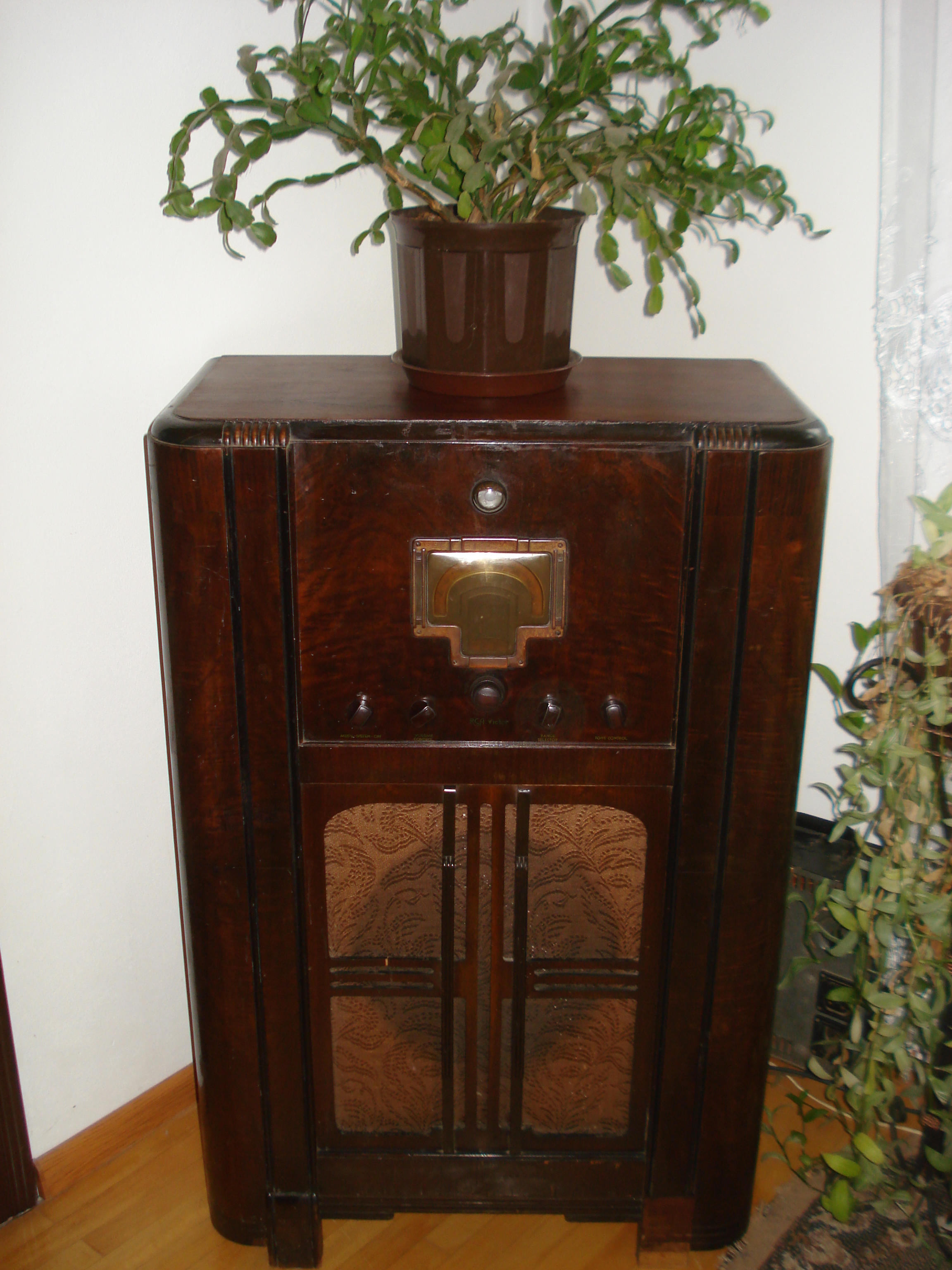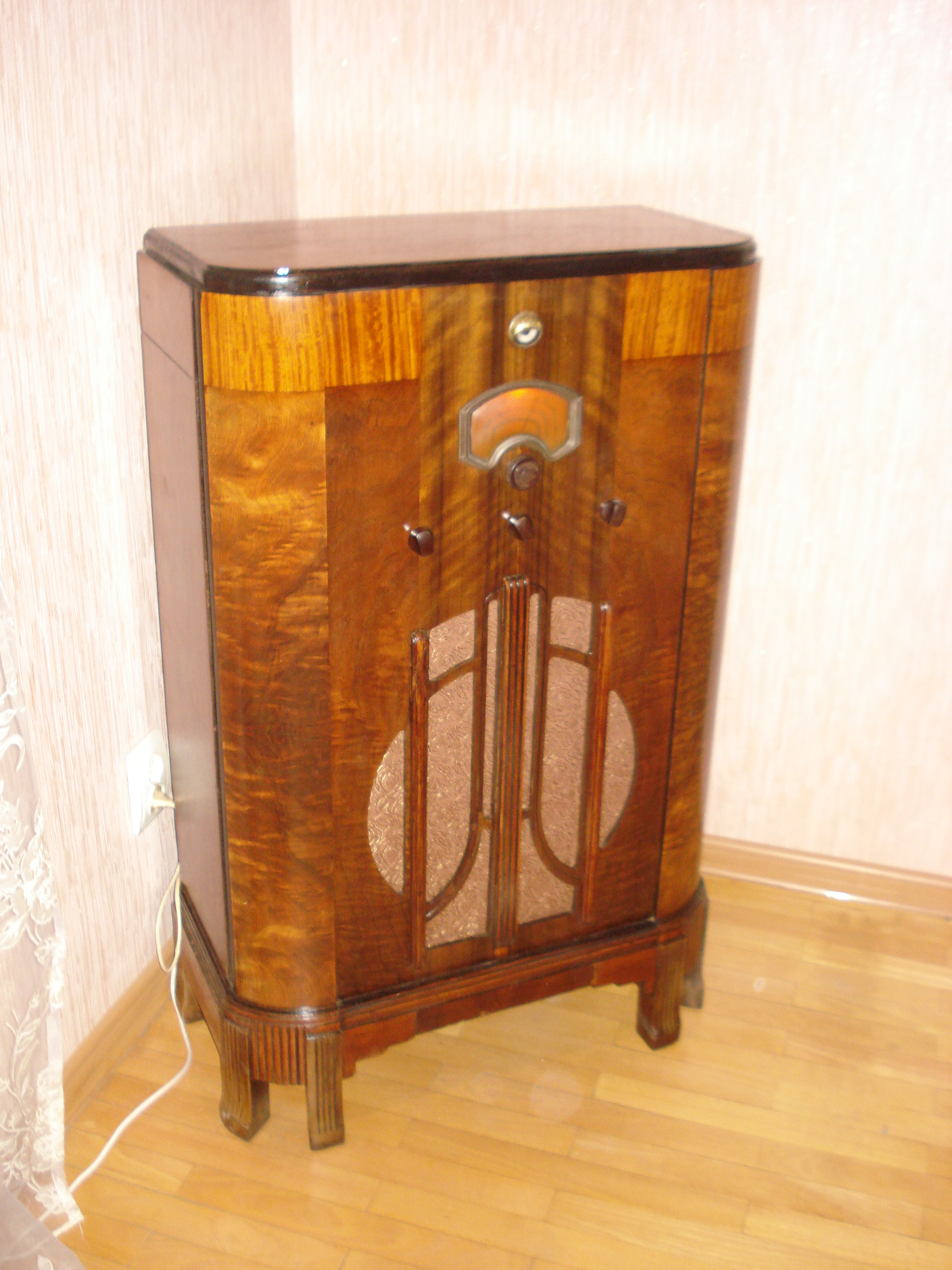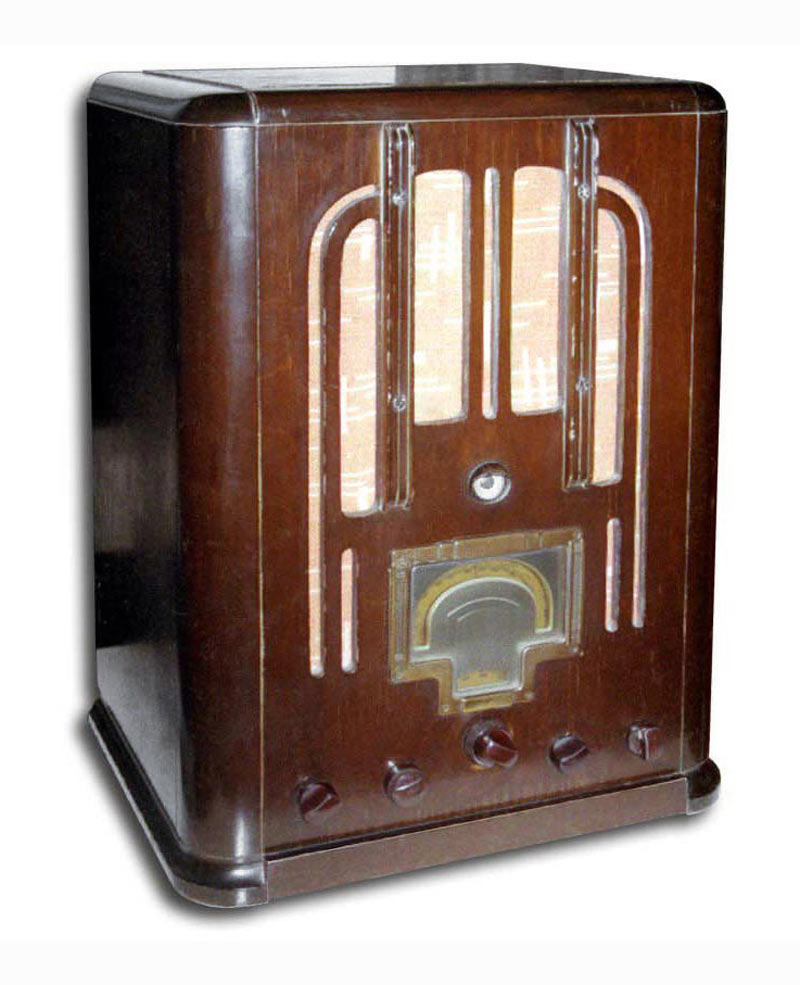The list of my radio & TV collection!
Posts: 572
Threads: 20
Joined: Nov 2014
City: Svalyava Transkarpatia
State, Province, Country: Ukraine
You have a wonderful collection of RCA radios, John. I envy you a little ...   I also agree with you that these models were the best and most technological in the company RCA in the 36th ... 37th years. I also agree that RCA is far ahead of Zenith in the quality of remote radio reception, but there are many criteria by which RCA is on par with Philco or inferior.
I compared the quality of 9K reception with my Zenit 9S-324BT and Philco 37-640x and saw that the Zenith 9S-324BT is inferior to its competitors in terms of sensitivity and noise level in all ranges, and Philco is inferior to RCA only in terms of noise level in the range 16 and 19 meters, but has a much higher amplifier power and sound level. And this is a very decent result, considering that Philco is only a 7-tube receiver.



For comparison, last week I repaired the 8-tube RCA C8-20 console receiver and it disappointed me very much - it is very inferior to all these models. But this is natural, because it is an earlier and imperfect generation of RCA.

Hmm. John, you gave me an idea for a new video ...  Thank you ... 
Old Tube Radio Online Museum / Музей ретро радіо
https://www.youtube.com/user/RadioSvit?d...lymer=true
Sincerely Peter
З повагою Петро
Posts: 572
Threads: 20
Joined: Nov 2014
City: Svalyava Transkarpatia
State, Province, Country: Ukraine
Quote:I bet it is very much the same as my RCA 9K2. Mine just has a extra band. Very sensitive bandwith
In fact, the 9K and 9K2 models have completely different chassis. The 9K has a simple single-storey chassis with an upper limit of 22 MHz, and the 9K2 has a more modern and advanced chassis with a HF subunit for reception at high frequencies up to 60 MHz and a more powerful woofer amplifier on a 6L6 radio lamp. And in the 9K model there is no "Magic Voice" ...  But even in this budget version, I really like this radio.

An interesting fact from history - in 1938 in the USSR under the RCA license made a desktop radio 9H4, which was a prefabricated compilation of the case from the desktop model RCA 9T and chassis from the console RCA 9K. And at that time it was the most perfect serial radio in the USSR and was produced exclusively for the state and military elite of the Soviet Union.  .


Old Tube Radio Online Museum / Музей ретро радіо
https://www.youtube.com/user/RadioSvit?d...lymer=true
Sincerely Peter
З повагою Петро
(This post was last modified: 02-12-2022, 09:54 AM by RadioSvit.)
Posts: 13,776
Threads: 580
Joined: Sep 2005
City: Ferdinand
State, Province, Country: Indiana
That is amazing, Peter. Your 9H4 looks like it could have been manufactured by RCA, with the possible exception of the power transformer.
It does appear, however, that your radio's dials held up better over the years than the typical American 9T, 10T, 9K, 9K2, etc. The dials of the American models usually get darker over time - especially the AM (MW) band which usually remained exposed the most.
--
Ron Ramirez
Ferdinand IN
Posts: 572
Threads: 20
Joined: Nov 2014
City: Svalyava Transkarpatia
State, Province, Country: Ukraine
Ron, I suspect that the Ministry of Radio Industry of the USSR purchased a batch of chassis from the RCA 9K console and the same batch of housings from the RCA 9T desktop receiver and replaced only the power transformers. Although the cases may have been manufactured in the USSR. Because otherwise it is very difficult to explain why in about two and a half years only about 1000 pieces of these receivers were made. In the Soviet Union, several developers did similar operations with the purchase of chassis lots from RCA-140 and RCA D-11, and here only replaced the inscriptions on the chassis signs and often even bought complete radios and replaced only the names. 
These are just my guesses because I have no confirmation in the documents, but ...
PS. Photo 9H4 is not mine, I do not have this radio - we have it is extremely rare and expensive. Now no more than 10 pieces have survived and they cost ridiculous money here. Although I would gladly buy an American 9T
Old Tube Radio Online Museum / Музей ретро радіо
https://www.youtube.com/user/RadioSvit?d...lymer=true
Sincerely Peter
З повагою Петро
Posts: 13,776
Threads: 580
Joined: Sep 2005
City: Ferdinand
State, Province, Country: Indiana
I see. And I apologize, I assumed since you showed photos of a 9H4 that it was your set.
RCA 9T radios do not come up for sale very often here in the USA, but I am sure there are many more of those here than there are 9H4 sets in Ukraine (and in Russia). I am fortunate to own both a 9T and a 10T.
Let's go back to your RCA C8-20 console model. Its circuitry is very similar to that of the table model RCA T7-5 with the addition of a tuning eye. I own a T7-5 and I am pleased with its performance. It does very well for a seven tube radio, I think. Perhaps there is an issue with your C8-20?
--
Ron Ramirez
Ferdinand IN
Posts: 572
Threads: 20
Joined: Nov 2014
City: Svalyava Transkarpatia
State, Province, Country: Ukraine
Maybe so, Ron. Although I checked all the cascades very carefully and aligned all the ranges, they aligned perfectly and very accurately. Maybe I'm not right, the radio receives radio stations quite well, but not better than Philсo 37-640. But I was a little confused by the rather low sound quality. Surprisingly, because the speaker is the same as in 9K and the amplifier is almost no different, and the sound is much worse than in 9K and 37-640
Old Tube Radio Online Museum / Музей ретро радіо
https://www.youtube.com/user/RadioSvit?d...lymer=true
Sincerely Peter
З повагою Петро
(This post was last modified: 02-12-2022, 10:45 AM by RadioSvit.)
Posts: 13,776
Threads: 580
Joined: Sep 2005
City: Ferdinand
State, Province, Country: Indiana
Perhaps the less than optimal audio quality is due to the fact that the C8-20 has a single ended 6F6 audio output and the 37-640 has a push-pull output?
But that isn't really correct either, since Philco resorted to "cheating" to get a push-pull output without the use of an audio interstage transformer or a phase inverter tube - they tapped an out of phase audio signal from one of the 6F6G output tubes and applied it to the control grid of the other 6F6G tube.
I would still suspect something not being quite right in the C8-20. As I mentioned, my similar T7-5 plays well and the sound quality is very good.
(I meant to type T7-5 in my previous post; I have now corrected it. Although I do also own a T8-14.)
--
Ron Ramirez
Ferdinand IN
Posts: 572
Threads: 20
Joined: Nov 2014
City: Svalyava Transkarpatia
State, Province, Country: Ukraine
The RCA 9K also has a one-stroke cascade and the Farnswort GK669 from my collection also has a one-stroke cascade, but they both have deep bass and a nice midrange. But in C8-20 the sound is like from a barrel - loud, but without the lower bass. The acoustics are not good enough. It's not very pleasant to listen to. Although it may just be my whim. 
Old Tube Radio Online Museum / Музей ретро радіо
https://www.youtube.com/user/RadioSvit?d...lymer=true
Sincerely Peter
З повагою Петро
(This post was last modified: 02-12-2022, 11:05 AM by RadioSvit.)
Posts: 572
Threads: 20
Joined: Nov 2014
City: Svalyava Transkarpatia
State, Province, Country: Ukraine
That's what this radio console is about ... RCA C8-20
PS. I forgot to say that I am annoyed by the high noise level RCA C8-20 on Broadcast and I do not know how to get rid of it.
[Video: https://www.youtube.com/watch?v=BOHmI9pyVtI&t=192s]
Old Tube Radio Online Museum / Музей ретро радіо
https://www.youtube.com/user/RadioSvit?d...lymer=true
Sincerely Peter
З повагою Петро
(This post was last modified: 02-12-2022, 01:51 PM by RadioSvit.)
Posts: 1,578
Threads: 98
Joined: May 2008
City: Omak
State, Province, Country: WA
Hello RadioSvit,
I really enjoying this thread !!
Sincerely Richard
Posts: 572
Threads: 20
Joined: Nov 2014
City: Svalyava Transkarpatia
State, Province, Country: Ukraine
Thank you Richard, I was absent from the forum for a long time and so I missed the forum.
Old Tube Radio Online Museum / Музей ретро радіо
https://www.youtube.com/user/RadioSvit?d...lymer=true
Sincerely Peter
З повагою Петро
Posts: 1,002
Threads: 9
Joined: Jul 2020
City: Greenlawn
State, Province, Country: NY
Hi Folks,
Philco did the same trick on my 41-250 and, I'm sure, on a lot of other sets of the same vintage. On the 41-25o, they put a resister between the "B" Output Tube (for a lackof a better designation) Screen and the A Output Tube Screen. B+ was connected to the B Tube. This allowed for "sampling" of the output of the A Screen and that "sample" was fed to the grid of the B Output Tube. In a way, this is the same way the average Phase Invertor Tube of the time worked. The "Cathodyne" Phase Invertor came later. I would think that when everything was in spec, if the signal was applied at the same strength and 180 Deg out of phase to the B tube, then the circuit should do everything a push-pull output should do- more power, less 2nd and 4th harmonic distortion.
I can't remember what brand guitar amp I saw the same thing on, but I have seen the same technique in at last one. This technique was also in some electronic text I read. It seems it was more popularly used by Philco than in others, but I think that they used the other types on their higher end radios and/or abandoned the technique post war, or maybe it did not work well on beam power tubes? 41s (6K6) and 42s (6F6) are pentodes.
"Do Justly, love Mercy and walk humbly with your God"- Micah 6:8
Best Regards,
MrFixr55
Posts: 1,002
Threads: 9
Joined: Jul 2020
City: Greenlawn
State, Province, Country: NY
Hi RadioSvit,
Other than the tone control, your C8-20 and 9K have similar Audio, Detector and IF Stages. The big difference is in the separate Oscillator and Mixer instead of (what we call in the US) the pentagrid convertor. However, on the broadcast band (540 - 1700 KHZ), performance should be the same.
I am big on dividing the radio between the Audio Amplifier and the rest of the radio and verifying the performance of the audio circuit. If you don't object to modifying the circuit, put a Radio - Phone switch in the C8-20 in a manner similar to the 9K. Pipe the same audio program from a computer, CD, etc. into both radios. If the Audio Amplifiers both sound satisfactory, troubleshoot the rest of the radio. You may want to leave the switch in. RCA sold a "Radio - Phono" Switch accessory for any radio back in the 1940s. Although it is "cheating" I like to do this because the quality of the sound is better than going through the radio circuit.
Is sensitivity an issue? I didn't see any response from the tuning eye when you were tuning the radio. Measure AVC voltages in both radios and compare. (Junction of R31, R32 and the Tubing Eye input on the C8-20, similar location on the 9K but my schematic is not clear enough to read the numbers). I think the voltages should be similar. If AVC does not go very negative on strong stations, troubleshoot the Antenna, RF and Convertor coils. another trick is to connect the antenna directly to the 6A8 Grid cap. If the sound is much better, then investigate everything before that point back to the antenna connection.
Hope that helps!
"Do Justly, love Mercy and walk humbly with your God"- Micah 6:8
Best Regards,
MrFixr55
Posts: 572
Threads: 20
Joined: Nov 2014
City: Svalyava Transkarpatia
State, Province, Country: Ukraine
Thanks , MrFixr55. I'll try to do that. Switch "Radio - phono" and a separate output "Phono" are very useful things. I did so on my Philco 37-640 and Philco 37-116 de Luxe.
Old Tube Radio Online Museum / Музей ретро радіо
https://www.youtube.com/user/RadioSvit?d...lymer=true
Sincerely Peter
З повагою Петро
(This post was last modified: 02-13-2022, 06:28 AM by RadioSvit.)
Posts: 572
Threads: 20
Joined: Nov 2014
City: Svalyava Transkarpatia
State, Province, Country: Ukraine
Quote: It seems it was more popularly used by Philco than in others, but I think that they used the other types on their higher end radios and/or abandoned the technique post war, or maybe it did not work well on beam power tubes? 41s (6K6) and 42s (6F6) are pentodes.
So . This scheme worked only on pentodes. A significant advantage of this scheme was the simplicity and economy of the additional cascade, but there were two significant disadvantages - underestimated maximum power (5 ... 6 watts instead of 8 ... 10 on two 6F6) and slightly greater harmonic distortion (up to 5% ... 8% instead of 2% ... 3%). That is why, in my opinion, such a scheme was used only in budget models and middle-class models.
But I will say that I do not hear significant distortions in Filko 37-640. Its sound is just very nice and despite the smaller speaker than the 9K is more powerful and clean.
Old Tube Radio Online Museum / Музей ретро радіо
https://www.youtube.com/user/RadioSvit?d...lymer=true
Sincerely Peter
З повагою Петро
Users browsing this thread: 7 Guest(s)
|
|
Recent Posts
|
|
Jackson 715 not working
|
| Mrfixr55, its working now. I cleaned the switches and sockets with spray cleaner. Thanks for helping on this one.daveone23 — 06:26 PM |
|
Jackson 715 not working
|
| Now that you posted the schematic, I don't know why that Sprague electrolytic cap is across the meter, as it is not indi...MrFixr55 — 05:51 PM |
|
HiFi (Chifi) tube amp build - but my own design.
|
| What may be lacking in the PP Tube amps may be the 2nd harmonics, which some, especially RCA back in the day called &quo...MrFixr55 — 05:32 PM |
|
Jackson 715 not working
|
| Usually in an emission tester, the tube under test is measured as if it were a diode. So, some testers connect all the g...RodB — 04:17 PM |
|
Restoring Philco 37-604C
|
| Yep. F5 is green, D5 is Red.
Red is Bad.
Green is Clean.morzh — 01:30 PM |
|
Jackson 715 not working
|
| I did start to do that but I stalled out because I could not figure out how the grid and plate get voltage. In this diag...daveone23 — 11:52 AM |
|
Restoring Philco 37-604C
|
| (Insert Homer Simpson "DOPF" Here.)
When all fails, look at the can. Took the Ron Ramirez advice, red Caig D...MrFixr55 — 09:23 AM |
|
Philco 91 Speaker Replacement
|
| From your text I am not sure if you intend to use the existing speaker with a resistor instead of the field coil.
It wo...morzh — 08:44 AM |
|
Philco 91 Speaker Replacement
|
| My field coil is bad. I am still hoping to find an original, but if I can't I will go with a fitting Philco speaker, 125...dconant — 08:34 AM |
|
Philco 91 Speaker Replacement
|
| As Rod said, it is OK to use a fitting speaker, and then look for an original one.
If you buy a Hammond 125 output tr...morzh — 08:15 AM |
|
Who's Online
|
There are currently 5412 online users. [Complete List]
» 1 Member(s) | 5411 Guest(s)
|
|
|

|
 
|

 I also agree with you that these models were the best and most technological in the company RCA in the 36th ... 37th years. I also agree that RCA is far ahead of Zenith in the quality of remote radio reception, but there are many criteria by which RCA is on par with Philco or inferior.
I also agree with you that these models were the best and most technological in the company RCA in the 36th ... 37th years. I also agree that RCA is far ahead of Zenith in the quality of remote radio reception, but there are many criteria by which RCA is on par with Philco or inferior.



 Thank you ...
Thank you ... 



![[-] [-]](https://philcoradio.com/phorum/images/bootbb/collapse.png)


